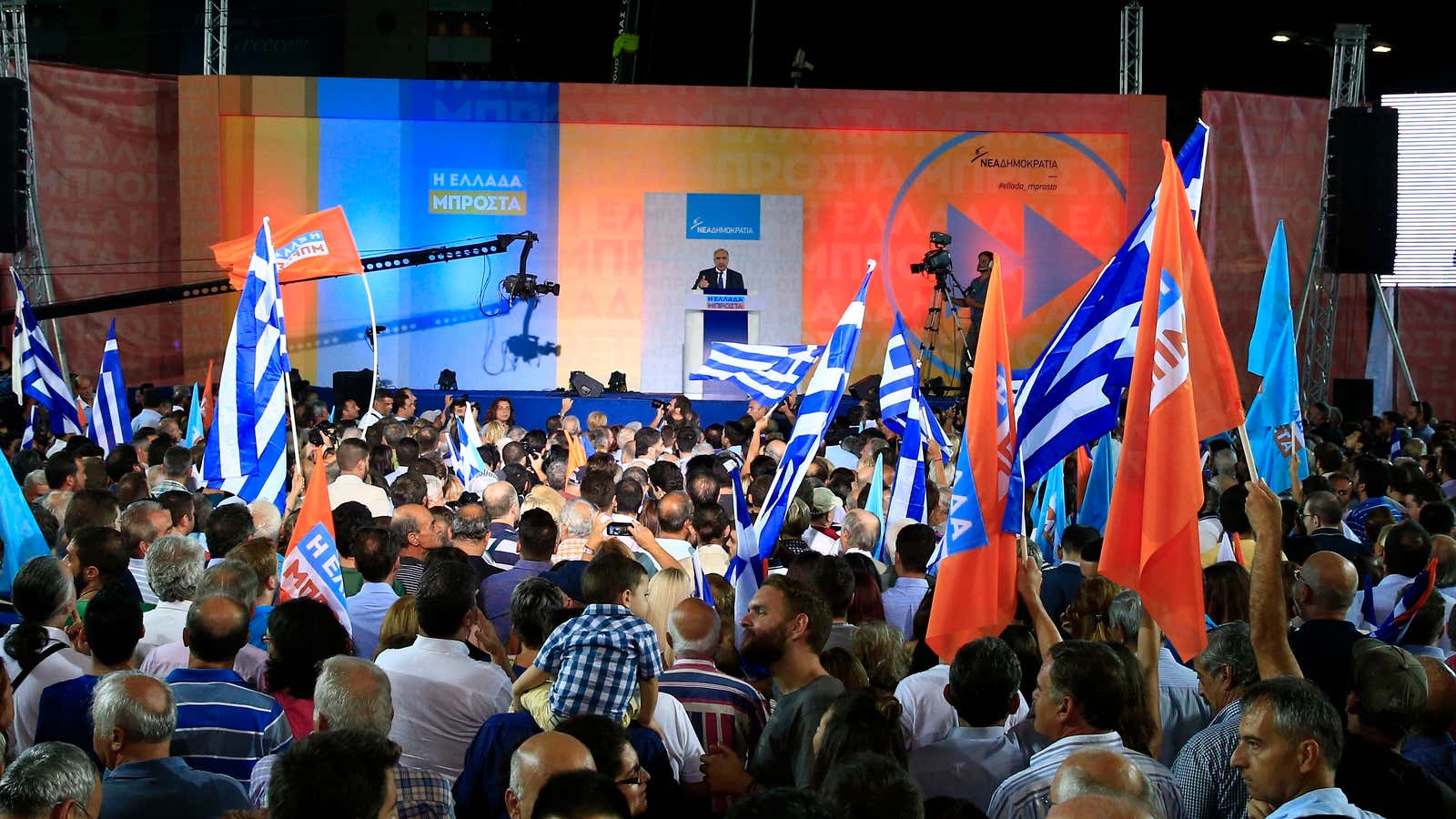For the third time in eight months, weary Greeks will head to the polls on Sunday, Sep. 20, after a summer that brought a snap referendum, the shutdown of the banking system, and capital controls that limited the withdrawal of cash to only 60 euros a day. Much is at stake; whichever party wins faces the responsibility of steering the debt-laden economy through many more months, if not years, of austerity. Here are four things to keep in mind as Greeks prepare to cast their ballots:
Why did Alexis Tsipras, the head of the radical-left party, Syriza, who was elected in January, call for elections so early into his term?
The short answer: it had become impossible for him to govern. Greece’s youngest prime minister ever (he’s only 40) came to power on an anti-austerity platform promising to renegotiate the austere terms imposed on Greece by its creditors—the European Central Bank, the Eurogroup and the International Monetary Fund. But seven months of wrangling in Brussels ended up bringing Greece to the brink of bankruptcy. At the 11th hour, Tsipras turned the tables, asking his countrymen whether they would accept the harsh agreement. Not surprisingly, nearly 60% of Greeks voted “No,” as Tsipras urged them to do, signaling they’d had it with austerity.
Three weeks later, Tsipras pirouetted, reached an agreement with Greece’s creditors for a new three-year agreement worth 86 billion euros (or $97 billion). His about face infuriated far left members of his party. They were led by Panagiotis Lafazanis, who fought Tsipras on every new measure he tried to pass. In the uncomfortable position of having to rely on members of the opposition, Tsipras resigned on Aug. 20 and called elections. Lafozanis’s Left Platform has since formed its own political party, Popular Unity, complicating the electoral scene even more.
What will the outcome be?
The latest polls show the race is too close to call. One, conducted by the research firm, Alco, for the news blog, Newsit, has Syriza with 25.3% of the vote, scraping ahead of the center right, New Democracy, by only 0.3 percentage points. Another poll had Syriza ahead with 3 percentage points, while a University of Macedonia survey for Skai TV and Kathimerini, one of Greece’s biggest dailies, put New Democracy ahead by half a percentage point, with 30% of the vote. What to believe? Hard to say, since Greece’s polls in recent elections past have been wildly off; none of them predicted the over 60% “No” vote in July.
Undecided voters—around 10% of the total—may also play a big part in how this election plays out—and many voters, especially younger ones, may cast blank ballots. “Abstention will be critical,” says Alexis Papachelas, the editor of Kathimerini. “If it is too high, that will hurt Syriza. Young voters who voted for Tsipras in overwhelming numbers and for the ‘No’ vote in the referendum feel betrayed.”
Come Sunday, even after the votes are tallied, however, who will head up the next government may not be clear. Why? Under Greece’s electoral system, a party needs 151 of the 300-seat parliament to govern. And even with the 50 bonus parliamentary seats granted to the party with the most votes, the victor may not necessarily have enough seats to form a government.
What happens if no party has a clear majority?
A coalition government must be formed. If that proves impossible, another round of elections might be necessary, which is the last thing Greece needs. Analyst Theodore Pelagidis, an economics professor at the University of Pireaus, and a fellow at the Brookings Institution, wrote earlier this month that there is a 90% chance that a coalition will be formed. If so, it won’t be the first time.
In January, Tsipras took the helm after teaming up with the politically-polar-opposite, anti-austerity Independent Greeks. This time around though, the Independent Greeks aren’t expected to win the 3% of the vote required to get into parliament.
This leaves Tsipras in a conundrum: Which party does he form an alliance with? New Democracy? Tsipras has said, “No way!” The party most likely to get the third most votes, the far-right Golden Dawn, is hardly a possibility. So that leaves the socialist PASOK, or the more centrist Potami (the River). If all this comes to pass, the only certainty with be another round of uncertainty.
Will Greeks even show up at the polls?
By most accounts, Greeks are suffering from ballot fatigue, and who could blame them. Rallies that usually draw huge crowds are visibly drawing smaller showings. “There is no real passion for this election,” says Papachelas. It’s hard to drum up excitement when the only prospect ahead is more hardship.
Nearly 25% of Greeks are out of work—and even though capital controls have loosened up a little, Greeks still can’t take out more than 420 euros ($470) from their bank accounts per week. “People are tired, “ says Papachelas. “They feel that whichever way they vote, the ‘memorandum straight jacket’ will be there.” And they’re right: no matter which party wins, it will have to respect the three-year $97 billion bailout agreement signed in July, and what comes with it, warts and all.




